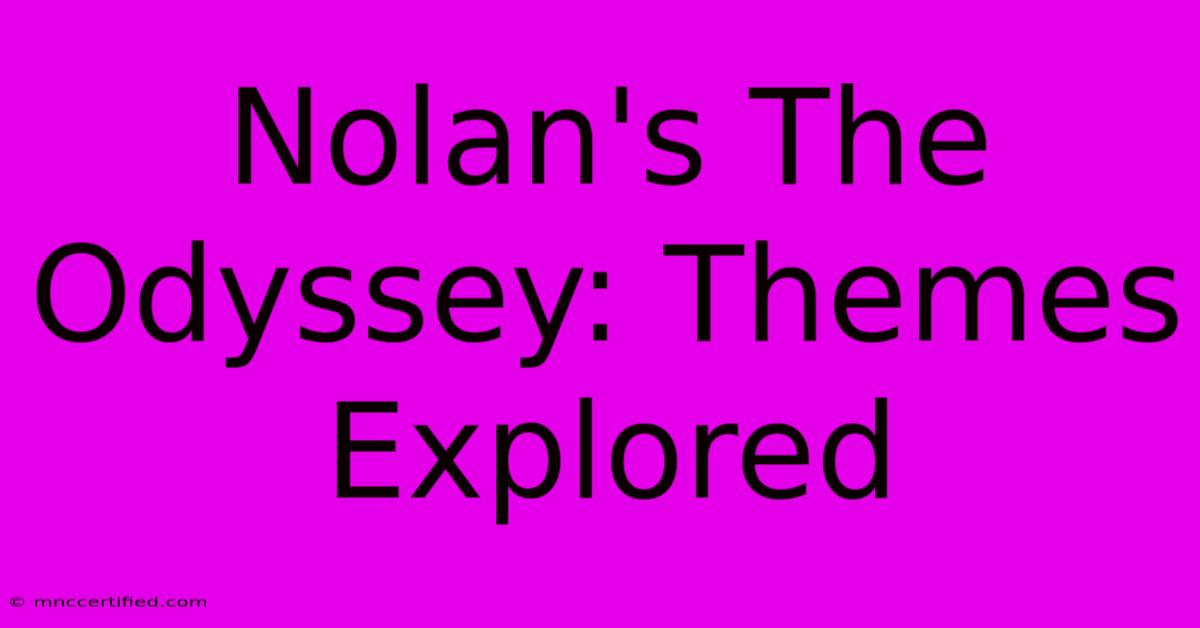Nolan's The Odyssey: Themes Explored

Table of Contents
Nolan's The Odyssey: Themes Explored
Christopher Nolan, renowned for his intricate narratives and mind-bending films, hasn't directly tackled Homer's Odyssey. However, the thematic echoes of the epic poem resonate powerfully throughout his filmography. By examining key themes in Nolan's work, we can draw compelling parallels to the journey of Odysseus, revealing a surprising depth of connection between the ancient tale and the modern cinematic master. This article explores these thematic overlaps, offering a fresh perspective on Nolan's oeuvre and the enduring power of Homer's classic.
The Perilous Journey: Identity and Transformation
Odysseus's ten-year journey home is fraught with peril, testing his physical and mental endurance. Similarly, Nolan's protagonists often embark on arduous journeys, both physical and psychological. Consider the relentless pursuit of self-discovery in Memento, where Leonard Shelby's fragmented memory forces him on a quest for his own identity. This mirrors Odysseus's struggle to reclaim his rightful place in Ithaca, a struggle that's as much internal as external. In Inception, Cobb's journey through the subconscious is equally perilous, a descent into the depths of his own psyche, echoing Odysseus's confrontations with the monstrous Cyclops and seductive Calypso. These narratives highlight the transformative power of struggle and the essential human need to overcome obstacles to find meaning.
The Weight of the Past: Trauma and Redemption
The Odyssey is heavily laden with the weight of past actions and their consequences. Odysseus’s past deeds, both glorious and terrible, constantly shape his present. This theme resonates deeply within Nolan’s work. In Dunkirk, the past is acutely present in the soldiers' harrowing experience, shaping their present-day struggle for survival. Similarly, Batman Begins and The Dark Knight explore Bruce Wayne's past trauma and his quest for redemption, echoing Odysseus's atonement for his transgressions. The past isn't simply something to be left behind; it’s a powerful force that shapes character and destiny, demanding reckoning and, potentially, redemption.
Fatherhood and Legacy: Duty and Responsibility
The Odyssey is also a story about homecoming and the yearning for family. Odysseus’s ultimate goal is to return to his wife Penelope and son Telemachus, fulfilling his paternal duties. This theme subtly appears in many Nolan films, though not always explicitly. The sacrifices made by Cobb in Inception to reconnect with his children demonstrate a deep sense of paternal responsibility. Even the morally ambiguous actions of Batman can be viewed through the lens of duty – his responsibility to protect Gotham reflects a paternalistic urge to safeguard his city. This resonates with Odysseus's responsibility to his people and his family, highlighting the complexities of duty and sacrifice.
Time and Memory: The Illusion of Control
The non-linear storytelling in films like Memento and Inception directly challenges our perception of time and memory, mirroring the fragmented and often unreliable nature of Odysseus’s own recollections. The cyclical nature of certain challenges in the Odyssey – constantly facing new obstacles even as he progresses toward Ithaca – finds an echo in the loops and layers of reality presented in Nolan's work. These narratives underscore the illusion of control over time, memory, and destiny, highlighting the powerful forces that shape our lives beyond our conscious grasp. This links thematically with the challenges Odysseus faces, suggesting that fate and circumstance play a significant role, even for the most determined hero.
Conclusion: A Modern Odyssey
While not direct adaptations, Christopher Nolan's films demonstrate a clear engagement with many of the core themes explored in Homer's Odyssey. The exploration of perilous journeys, the weight of the past, the responsibilities of fatherhood, and the unreliable nature of time and memory creates a fascinating dialogue between the ancient epic and contemporary cinema. This resonation showcases the enduring power of these themes and the timeless appeal of the hero's journey. By understanding these connections, we can gain a deeper appreciation for both the literary masterpiece and the cinematic brilliance of Christopher Nolan.
Keywords: Christopher Nolan, Odyssey, Homer, Themes, Memento, Inception, Dunkirk, Batman Begins, The Dark Knight, Journey, Identity, Transformation, Trauma, Redemption, Fatherhood, Legacy, Duty, Responsibility, Time, Memory, Illusion of Control, Hero's Journey, Cinematic Analysis, Film Analysis, Literary Analysis, Greek Mythology.

Thank you for visiting our website wich cover about Nolan's The Odyssey: Themes Explored. We hope the information provided has been useful to you. Feel free to contact us if you have any questions or need further assistance. See you next time and dont miss to bookmark.
Featured Posts
-
Mega Millions Jackpot Hits 1 15 Billion
Dec 25, 2024
-
American Airlines System Outage Causes Delays
Dec 25, 2024
-
Tonights Mega Millions Christmas Eve Jackpot
Dec 25, 2024
-
Times News White Christmas Story
Dec 25, 2024
-
New Nolan Film All Star Cast Adaptation
Dec 25, 2024